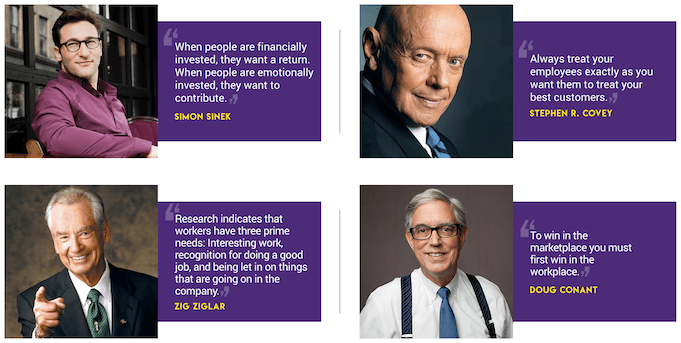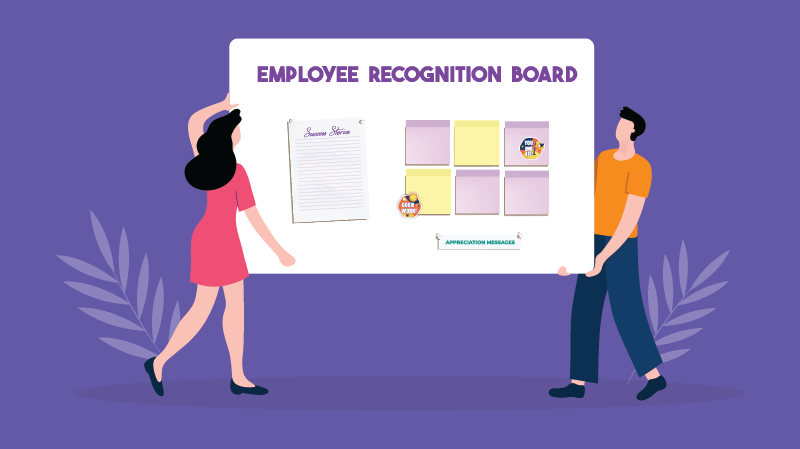7 Effects of Employee Recognition on Business
People work for money but go the extra mile for recognition, praise, and rewards.
-Dale Carnegie, Leadership Training Guru
Reading the quote mentioned above, you might have already figured out what this blog is about.
You’re right! It's about employee recognition and its impacts on business.
But at first, do you still believe that money is enough to keep the employees motivated?
If your answer is a “YES”! Then allow me to change your mind here.
True, employees work for money. They eagerly wait for that joyful day when their salary gets credited.
But that’s for just one day, right?
For the rest of the days, the employees often have to go through many hardships at work. And these hardships deserve more than just a handsome salary at the end of every month.
The thing that's missing here is acknowledging the good work done by one or the other employee every day.
Being humans, we develop the zeal to do more when we feel appreciated. Employees are no different in this regard.
The present-day workforce is more concerned about how their workplace treats them rather than how much it pays.
However, focusing on the bigger picture of achieving maximum productivity, employers often overlook recognizing workplace achievements.
Employers may view recognition as an unnecessary practice. But believe me, even a “Good Job” told by you can make an employee's day and lift their morale.
Employee Recognition and Its Importance
People want to know they matter, and they want to be treated as people. That’s the new talent contract.
– Pamela Stroko
Employee recognition is the practice of acknowledging an individual or team for their hard work and achievements that align with the company’s goals.
In short, it is giving respect to the good work done by the employees.
Just like every other human being, employees deserve respect at their workplace. It is only then when they realize their worth. Employers who realize this fact have hit the final nail in the arc of employee engagement.
Keeping up to the high standards of productivity is only possible when the employees feel motivated. And the only magic potion here lies in recognizing their hard work.
Employees like it when their work gets noticed and praised upon. Furthermore, it adds to their self-confidence, preparing them for bigger challenges ahead.
Moreover, recognition in the workplace gives employees a sense of belongingness to the workplace. Thus, inspiring them to go an extra-mile for doing good in their workplaces.
With productivity being the buzzword around workplaces today, the need for recognizing your employees has become the utmost priority for organizations.
Here are some interesting facts about employee recognition:
- It is the most cost-effective way to boost employee morale.
“Recognition is the number one thing managers can give to their employees to inspire them for producing great work. Not even pay hikes, promotion or autonomy come closer to recognition when it comes to motivating employees.”
(Source: Forbes)
- Organizations with Employee Recognition programs experience a positive impact on their company culture.
“83% of HR Leaders say an employee recognition program benefits organizational values”.
(Source: Workhuman)
Related article: The Ultimate Guide To Employee Rewards and Recognition
- Employees who feel valued and appreciated at the workplace would not hesitate to cover an extra mile for the organization.
“69% of workers agreed they would work harder if their efforts are better appreciated”.
(Source: Socialcast)
- Recognition programs help in bridging down communication gaps and build trust in the workplace.
“50% of employees believe they not only improve their workplace relationship but also develop trust on the higher-ups when appreciated by managers.”
(Source: Cicero Group)
- Peer-to-Peer form of recognition is more effective than only managerial recognition.
“41% companies that incorporate peer-to-peer recognition have seen a positive increase in customer satisfaction.”
(Source-SHRM)
Learn more: 25 Employee Recognition Statistics You Shouldn't Ignore in 2021
The importance of employee recognition can be endorsed by the fact that global business leaders have vouched upon its effectiveness.

Effects of Employee Recognition on Businesses
Employee recognition is a vital part of today's businesses. Employees who feel their contribution matters to their employer outperform the employees who don’t.
The employees execute the plans on behalf of their employers and work towards the common goal of success. The effects of employee recognition on businesses expand over multiple domains. These domains together form the backbone for a stable and efficient organization.
Here are the 7 Effects of Employee Recognition on Businesses:
COMPANY CULTURE
85% of HR Leaders say an employee recognition program has a positive effect on organizational culture.
(Source: Workhuman)
If employees are the heart of every organization, then a good company culture is like the soul attached to it. It is the combination of a company’s vision, goals, and ideologies for achieving the greater good.
Honoring the employees' efforts by recognizing their work paves the way towards a healthy company culture. This ultimately reflects back in the form of employee happiness. And when the employees feel happy working for the organization, achieving success becomes inevitable.
EMPLOYEE RETENTION
It is often said, ”Employees don’t leave the company, they leave their boss”.
27% of employees leave their jobs because of lack of recognition.
(Source-Randstad)
On the other hand, companies with a recognition program saw a staggering 51 percent increase in employee retention, according to SHRM.
Employees who receive recognition on a day-to-day basis are less likely to turn over their jobs than employees who don’t. Recognition programs give employees a reason to stay connected to their respective jobs. That reason here is the respect which they get from the seniors every time they do something good. Thus, encouraging employees to perform better and give their best at their work each day.
EMPLOYEE ADVOCACY
66% of HR Managers agree recognition helps towards creating a strong brand.
(Source- Officevibe)
Employee advocacy is the practice of reaching out to the crowd through the employees.
Employees who get recognized for their work are more likely to recommend their workplaces to others. A robust recognition program encourages the employees to become the voices of their organizations. Eventually, it also helps the organization build a strong base for its marketing activities and reach out to potential partners and customers.
Nowadays, employees share their achievements and workplace recognition on social media. This impacts the organization's brand value positively by exposing its work culture to a wide audience range. Thus, improving talent acquisition by attracting the best people to work.
EMPLOYEE ENGAGEMENT
84% of HR Leaders say an employee recognition program helps employee engagement.
(Source- Workhuman)
Being an employer, the only thing you can do to improve engagement at zero cost is to ** "Recognize your employees"**.
Organizations worldwide are in the rat race to achieve maximum productivity with minimum efforts. Their search for incorporating the same at the workplace ends at the practice of employee engagement.
Recognition is an inevitable part of the employee engagement practice. Employees who feel recognized are more engaged and active in their jobs.
PRODUCTIVITY
As found by SHRM, the companies with employee recognition as their part witnessed 63% increase in employee productivity compared to others.
Every organization wants its employees to excel in terms of productivity. But fostering it out of the employees is a humongous task.
Most employers may believe that gifting their employees from time to time will boost their productivity. However, the fact is that it doesn't even go around anywhere near that.
As per a study by Officevibe, 82% of employees prefer being praised than being gifted.
When employers praise their employees, they feel happy, which inspires them to do more. Thus, helping the employees explore their true potential and motivate great work.
POSITIVE BALANCE SHEET
The most crucial factor of all the other points listed.
As cited above, the same study by SHRM also found that recognition programs helped companies increase their profit margin by 58%.
Every organization strives to generate more and more profits. They want to see their growth chart going up every day. And keeping the growth intact depends hugely on how the employees feel and perform at the workplace.
Staff recognition practices at the workplace drive the wheel of employee productivity and satisfaction parallelly.
When the employees are physically motivated and mentally satisfied the numbers are bound to go up without any doubt.
WORKPLACE RELATIONSHIPS
86% of HR Leaders say an employee recognition program benefits employee relationships.
(Source- Workhuman)
Running an organization is not a lone ranger task. It needs the dedication of multiple teams and managers to get things to flow smoothly. And hence requires a strong bond of trust and confidence between them.
When you recognize employees, it builds up their trust and confidence in you. They can act more openly and convey their ideas. This, in turn, improves the overall professional relationships which everyone shares at their workplaces.
Being a manager or a peer, by recognizing and praising the efforts of your colleagues, you are more likely to foster a good relationship than by other means.
Related article: 50 Rewards and Recognition Ideas to Boost Employee Recognition
MENTAL HEALTH OF EMPLOYEES
Among the many positive effects of employee recognition, even the aspect of mental health finds a place.
Having great mental health nowadays is imperative for keeping up the productivity amongst all the chaos. And recognizing employees for their efforts at work frequently is much needed to uplift their mental & emotional well-being.
The reason behind this is when our brain identifies the moments of joy or achievement; it releases dopamine AKA the happiness hormones. These hormones elevate our mood and fuels our zeal to do even better. The same goes for your employees, too.
Every HR leader must be aware of all these little things to bolster their employee engagement efforts.
Related article: Impact of Rewards and Recognition On Mental Health
The Bottom Line
Everyone wants to be appreciated, so if you appreciate someone, don’t keep it a secret.
– Mary Kay Ash
Employees feel happy and motivated when they know they matter and, most importantly, their work matters. And employees who are happy and motivated tend to be more industrious.
Amplifying their happiness further through acknowledging their efforts publicly or in-person is what recognition is all about. However, employers often confuse recognition with rewards and end up associating it with extra expenses. But praising employees can be as simple as saying a simple “Well done” or “Good Job”.
An employee works hard to hear these words from their seniors, and you shouldn’t hesitate to say them.
Related article: Top 102 Employee Recognition Quotes To Celebrate Their Endeavours
Do you have any more ideas on employee recognition? If so, please drop us an email. We would love to include your suggestions on this list.




















